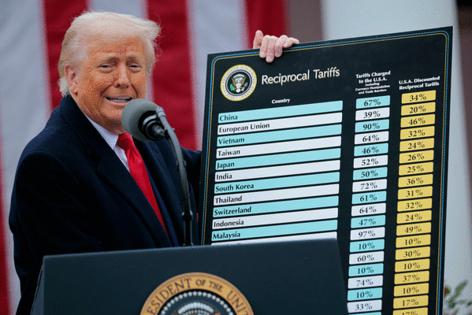Trump tariff 'blank check' must be curbed, appeals court told
Published in News & Features
A group of small businesses that won an order finding President Donald Trump’s sweeping global tariffs illegal urged a federal appeals court to uphold that decision and block the trade levies.
The U.S. Court of International Trade ruled on May 28 that Trump exceeded his authority by imposing broad tariffs, a power granted to Congress in the Constitution. That decision was temporarily put on hold by the U.S. Court of Appeals for the Federal Circuit, which will hear arguments July 31 on whether to let it go into effect or extend the stay. The companies challenging the tariffs filed their brief in the Federal Circuit on Tuesday.
“The government’s claim of unbounded power to set, reset, rescind, and reapply tariffs of any amount against any product, based on a unilateral and unreviewable emergency declaration, runs contrary to the plain text” of the law, the businesses said in their brief.
The appeals court showdown comes as Trump’s aggressive tariffs continue to roil global markets. The hearing will take place a day before Trump’s newly announced Aug. 1 deadline for tariffs go into effect, replacing his earlier July 9 date. He’s insisted there will be no further extensions.
At issue is Trump’s interpretation of the 1977 International Emergency Economic Powers Act, or IEEPA, which says the president can “regulate” certain foreign transactions during times of crisis. The president claims that persistent U.S. trade deficits amount to a national emergency, allowing him to evoke the IEEPA, but the companies contend that interpretation is overly broad.
“If such generic language authorized taxation, the president would have vast taxing powers that no president in US history has ever been understood to have,” the businesses said in their brief. “IEEPA is thus properly understood as a sanctions and embargo law, not a blank check for the president to rewrite tariff schedules.”
The companies, led by New York wine importer V.O.S. Selections Inc., also claim that the impact of the tariffs is so sweeping that the matter requires Congressional action under the “major questions” doctrine. Arguing that Trump’s tariffs will “reshape” the U.S. economy, the companies say they will face much higher costs and lower sales, with some of them likely to end up in bankruptcy.
The administration filed its own brief in the appeals case last month, arguing that Congress had “delegated” tariff authority to the president to bolster his ability to manage foreign affairs. It further claimed that blocking the tariffs would disrupt U.S. diplomacy and jeopardize highly sensitive trade negotiations with other nations.
But the companies said Tuesday that Trump’s back-and-forth threats on tariffs and the resulting uncertainty were evidence that he was misusing the emergency law.
The White House didn’t immediately respond to a request for comment on Tuesday.
If the appeals court ultimately rules against Trump’s tariffs, the Justice Department has said that it would ask the U.S. Supreme Court to immediately intervene in the fight.
©2025 Bloomberg L.P. Visit bloomberg.com. Distributed by Tribune Content Agency, LLC.







Comments